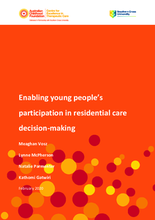Introduction
The literature on how young people participate in decision-making in residential care identifies three main aspects of participation: being able to access information to take part in decisions that matter; having opportunities and capabilities to express their views freely; and having an impact on the outcome of the decision-making process (Bessell, 2011, 2015; Lansdown, 2018; Sinclair, Vieira, & Zufelt, 2019). These key aspects of meaningful and authentic participation also include having the space and time to reflect, form a view, change one’s mind, and consult with an advocate that may shift the inherent power imbalance in residential care decision-making (Davis, 2019; Wong, Zimmerman, & Parker, 2010). Because young people in residential care have experienced an extreme intervention in their freedoms and rights, participation should necessarily involve more than having a say in individual matters and include expressing views and being taken seriously in matters relating to policies and systemic decisions that affect their lives (Davis, 2019; Lansdown, 2011).
Yet in the most recent survey of 321 children and young people in residential care in NSW, 60% of whom were aged 15-17 years old, only 49% said they usually get a chance to have a say and usually feel listened to; 21% said they don’t usually get to have a say and don’t usually feel listened to, and these rates were worse amongst females (Robertson, Laing, Butler, & Soliman, 2017). When this survey was repeated in 2018 with 143 young people, the percentage who reported that they usually get a chance to have a say and usually feel listened to reduced to 48%; and the proportion who don’t usually get to have a say and don’t usually feel listened to increased to 25% (NSW Department of Communities and Justice, 2019).
This brief addresses the following issues in young people’s participation:
- Understanding participation
- Participation for groups of young people in residential care
- Why is participation important?
- Benefits of participation
- Models of participation
- Enabling practice: implications for practitioners and organisations
- Young people’s participation in service, program and policy design.

